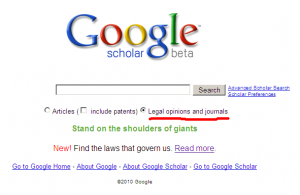Recently came across the news (now somewhat dated) that Google has now incorporated some full-text legal decisions from the US into Google Scholar.
From the Official Google Blog:
Starting today, we’re enabling people everywhere to find and read full text legal opinions from U.S. federal and state district, appellate and supreme courts using Google Scholar. You can find these opinions by searching for cases (like Planned Parenthood v. Casey), or by topics (like desegregation) or other queries that you are interested in. For example, go to Google Scholar, click on the “Legal opinions and journals” radio button, and try the query separate but equal. Your search results will include links to cases familiar to many of us in the U.S. such as Plessy v. Ferguson and Brown v. Board of Education, which explore the acceptablity of “separate but equal” facilities for citizens at two different points in the history of the U.S. But your results will also include opinions from cases that you might be less familiar with, but which have played an important role.
Perhaps not surprisingly, the announcement seems to suggest less an emphasis on targeting lawyers as the primary audience, but rather the general public. In fact, in a recent ABA Journal article, Google’s representative even suggested that Google wouldn’t be of much value to lawyers:
Google, meanwhile, is not trying to compete with the likes of West, LexisNexis, Bloomberg, Fastcase or any other commercial legal research company, says lawyer Rick Klau, a project manager at Google who helped build the Scholar database.
“There is no attempt to slay anyone here,” Klau says. “Google’s mission is to organize the world’s information and make it useful. This was a collection of content that was not accessible and well-organized.” He says Google Scholar was designed to make the information accessible for ordinary citizens. The company has no current plans to do more with the information than what is already available.
Google’s database allows users to search its content against any words, concepts or citations and will pull up opinions related to the searcher’s query. The results are ranked by relevance. Citations in the opinions are hyperlinked to other opinions. The results also provide links to other Google databases, such as books and law reviews, to help searchers get context.
But Google Scholar does not provide any sort of system to check the validity of the case, nor does it offer any type of taxonomy of the case.
Klau goes so far as to question the value of Google Scholar to practicing lawyers: “The two primary for-pay services provide tremendous value to their users and help you better understand and consume information, like whether an opinion is still valid. Those are things that practitioners rely on and will continue to rely on.”
Despite Klau’s protestations, others in the legal information sector are watching Google. “You are always very conscious of what Google is doing because the company has immense resources available,” says Warwick of Thomson Reuters.
That same article also describes how LexisNexis and Westlaw, the two Microsofts of the legal information industry, will be implementing sweeping changes in their services. I imagine those changes were prompted less by Google’s foray into the legal information industry and more by the entrance of Bloomberg into the market, and the desire to capture a greater share of what seems to be a shrinking market.
In any event, Google isn’t really reinventing anything here but rather making it a bit more convenient to access and use – apparently all of this material had previously been available on various court and other web sites. Google’s value add was to consolidate it all and make it easier to search and use.
Too bad. It would have been interesting to see Google shake things up a bit in the legal information industry (or for that matter the information industry more generally). Then again, you never know…

